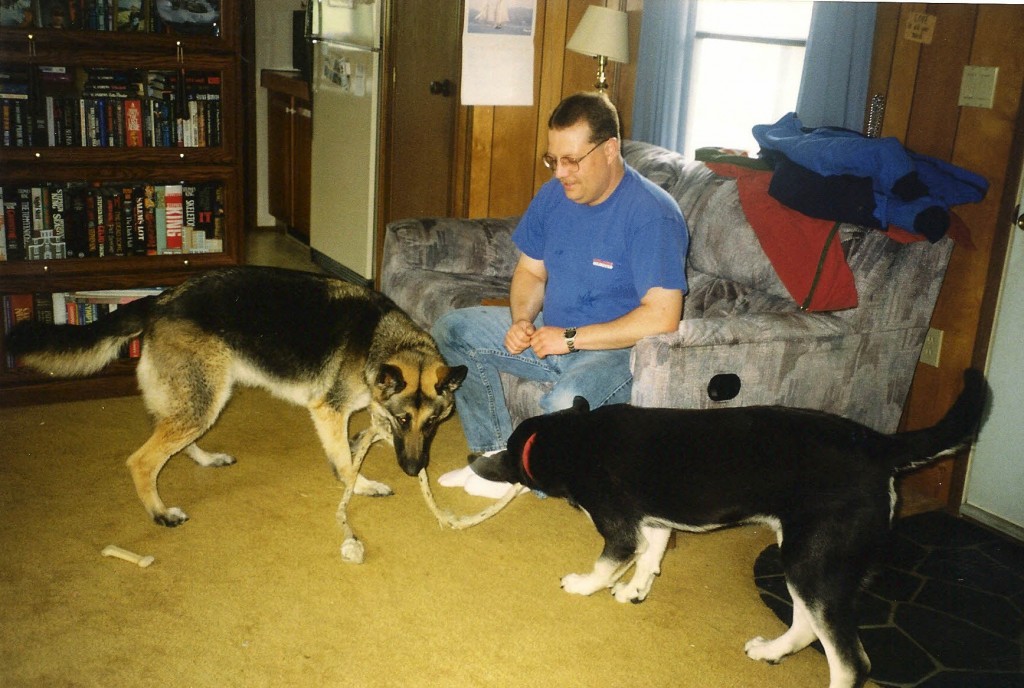Justin Faloon’s first heart attack happened June 1,1999, when he was only 29. He was lucky. He could have died, especially because he waited 20 minutes or more before dialing 911. That’s his primary message these days: never ever wait if you think you’re having a heart attack. Call for help immediately.
He remembers the day like it was yesterday. He woke up at 6:50 a.m., not feeling well. “I was nauseous,” he recalls, “and went into the bathroom and looked in the mirror. My color was grey and then I started getting really bad chest pains.”
That’s when he should have called for an ambulance. He knew that — he worked in security at St. Joseph Hospital in Bangor. He used to be with the Old Town Fire Department. He had taken CPR and first aid classes. “I knew what was going on,” he says. “I had a pretty good idea I was probably looking at a heart attack. I went back to bed and I went into denial. I was saying to myself, ‘I don’t have time for this. I’ve got work. I have stuff going on. I’m too young. I’m going back to sleep.’ I woke up about 20 minutes later and the chest pains were unbearable.”
What he should have done immediately
Justin finally called 911 and went out onto his deck to wait. He was worried that if he waited inside, his beloved and extremely loyal German Shepherd wouldn’t let anyone near him. He’s pretty sure the paramedics found him lying unconscious. In the ambulance, he remembers watching them hook up an IV and all of sudden, all of his pain went away. “I was just laying there, looking out the back door feeling great ,” he remembers, “and I could see one of the paramedics grab the paddles — the defibrillator. As he turned around, all of the pain came back. He told me later that I had coded.”
Justin survived his first heart attack and a second one while he was still in the hospital, but his heart was damaged. “I truly believe that if I had called 911 earlier, I would have had less damage, maybe none at all. I knew better.”
Luckily, his heart was still strong, but he needed a stent to open up his clogged artery. The way he puts it, “The pump’s good. It’s the plumbing that clogs up.”
Why Justin’s at risk
Coronary artery disease runs in Justin’s family. His dad had problems and so do his brothers. His LDL or “bad” cholesterol is pretty good. See the charts below from the American Heart Association to what’s good and what isn’t. The lower your LDL cholesterol, the lower your risk of heart attack and stroke. In fact, it’s a better gauge of risk than total blood cholesterol. In general, LDL levels fall into these categories:
| LDL Cholesterol Level | Category |
| Less than 100 mg/dL | Optimal |
| 100 to 129 mg/dL | Near or above optimal |
| 130 to 159 mg/dL | Borderline high |
| 160 to 189 mg/dL | High |
| 190 mg/dL and above | Very high |
Justin’s HDL or “good” cholesterol is too low, usually hovering around 20 mg/dL
| HDL Cholesterol Level | Category |
| Less than 40 mg/dL (for men) Less than 50 mg/dL (for women) |
Low HDL cholesterol. A major risk factor for heart disease. |
| 60 mg/dL and above | High HDL cholesterol. An HDL of 60 mg/dL and above is considered protective against heart disease. |
Triglycerides are Justin’s biggest issue. The levels are always way too high — sometimes out of control — in the 3000s even. Triglyceride is the most common type of fat in the body. Many people who have heart disease or diabetes have high triglyceride levels. Normal triglyceride levels vary by age and sex. A high triglyceride level combined with low HDL cholesterol or high LDL cholesterol seems to speed up atherosclerosis (the buildup of fatty deposits in artery walls). Atherosclerosis increases the risk for heart attack and stroke.
| Triglyceride Level | Category |
| Less than 100 mg/dL | Optimal |
| Less than 150 mg/dL | Normal |
| 150–199 mg/dL | Borderline high |
| 200–499 mg/dL | High |
| 500 mg/dL and above | Very high |
Your total cholesterol score is calculated by the following: HDL + LDL + 20% of your triglyceride level.
| Total Cholesterol Level | Category |
| Less than 200 mg/dL | Desirable level that puts you at lower risk for coronary heart disease. A cholesterol level of 200 mg/dL or higher raises your risk. |
| 200 to 239 mg/dL | Borderline high |
| 240 mg/dL and above | High blood cholesterol. A person with this level has more than twice the risk of coronary heart disease as someone whose cholesterol is below 200 mg/dL. |
Medications haven’t worked for Justin because he appears to allergic to them. He tries to maintain a healthy diet, but exercise is a challenge because it causes angina. “There are days that I go 100 yards and I’m done,” he explains.”I have to stop and take a rest before I can continue on. People ask me why I don’t exercise more. I’d love to.”
Life after two heart attacks
In the five years after his heart attacks, Justin needed one more stent. He also endured several false alarms.”Before you have a heart attack,” he says, “if you get a pain in your chest you don’t think about it being a heart attack. But once you’ve had one, the mental aspect kicks in. First you feel the pain and start thinking, ‘Is it my heart?’ Before you know it, a little adrenalin kicks in, your pulse and heart rate pick up, and your breathing becomes labored. Then anxiety kicks in. I’ve learned to talk myself down, but it took a few trips to the emergency department.”
At the five-year mark, Justin started feeling tired and rundown and then one day he passed out. A heart catheterization revealed several blocked arteries — which led him to the operating room, where he had a quintuple bypass. A few months later, after going through a cardiac rehab program — something he highly recommends because of the physical and mental benefits — he went back to work and life was good for about three years.
After that, his life became a blur of one stent after another. He jokes, “According to the Guinness Book of World Records, I have the most stents. I always used it as a joke, saying, ‘I’m going for the world record.’ Now I say, ‘I was kidding.’ Be careful what you wish for or, in my case, kid about. They listed 34 and I have 35. I have also tied the record for the most put in at one time, which is seven.”
More heart attacks
For most of his working life, Justin was in security management. In his last job, he was a lead surveillance agent at Hollywood Casino in Bangor. His heart doctor tried to persuade him to quit and go on disability. It wasn’t until 2011, after he had two more heart attacks back-to-back, that he finally gave in. It doesn’t mean he gave up.
Now 46 years old and retired, Justin Faloon still leads a full and purposeful life. He does a lot with his family, especially his 10-year-old nephew Aaron. He teaches CPR and first aid classes and volunteers with the Down East Emergency Medical Institute in Orono. He looks after the Humvees and although he can’t do ground searches, he can help lead them. For example, just last night he participated in a search in Bangor. “I was in one of our Humvees as mobile command leading six mobile teams and one K9 team,” he describes. “If we had found an area that needed to be searched by foot, I would have deployed a ground team and stayed at mobile command and led the search from the start point. I can’t go out and pound the bushes, so to speak, but I can contribute. I’d like people to see that if they suffer a heart attack or other life altering injury, there are still important things to continue on for — even if it’s not exactly what you want to do.”
Last Thanksgiving, he even saved a man’s life. You can read about it in the Bangor Daily News.
Justin is also an American Heart Association volunteer. He believes the association has played a role in keeping him alive because money raised has gone to research and education. On Saturday, February 22, he’ll be honored as a “Heart Hero” at the 15th annual Northeastern Maine Heart Ball at the Cross Insurance Center in Bangor. Spokesperson Brenda Vitali states, “The Heart Ball is the AHA’s major fundraising event in the Bangor area with a goal to raise $125,000 to support the AHA’s research, education and advocacy necessary to combat cardiovascular disease — Maine’s leading cause of death. Since its inception, the event has raised over $1 million.”
If you’d like to attend or get more information about the upcoming Heart Ball, visit the American Heart Association website.
Justin will be giving a speech at the event and, yes, he won’t forget to tell people if they think they might be having a heart attack not to waste any time calling 911 like he did.
He also plans to share another important message. “The biggest thing that I believe now,” he says, ” is to live your life the way you want people to remember you and enjoy every second. It can be gone in less than a second. Everything gone. Live like there’s no tomorrow.”




Leave A Comment